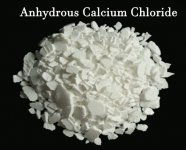I haven't tested CH within last few days at least (does it rise naturally at all?)
I hate to answer this question because someone who knows far more than I do should be answering it for you.
I came here from a search seeking the best prices for calcium chloride (I
am contemplating adding about 50 pounds of Calcium Chloride also as my CH is at 200ppm but the saturation calculation takes into account more factors than just calcium hardness alone, e.g., my TA levels are higher than most).
Given I just want you to have the right answer, please take my answer below to your questions above with a grain of salt, but... it's my understanding... that...
Q:
Does CH rise naturally?
A:
No. Not unless...
Not unless it's being taken from the pool surface - but your surface is fiberglass, right?
Well, even that answer is not exactly correct yet, as I understand it, your pool is new, and, as a brand new cementitious pool will apparently have a rise for a while as the surface plaster "dust" dissolves into the pool water [cementitious calcium hydroxide carbonates with carbon dioxide in pool water to yield calcium carbonate] - but again - you have a fiberglass liner, right? So that isn't happening. Also, the devil is in the details as dilution (from rain/snow, which is distilled water) will lower the CH and evaporation will raise the CH levels.
As for testing "within the last few days", I can't imagine that you have to test CH all that frequently given it doesn't really change (other than by those factors above) in just a few days' time.
If it doesn't rise naturally, how would I legitimately add 52lbs or 837oz of Calcium Chloride like PoolMath is suggesting?
Hmmmmm... there are people who put Calcium Chloride flakes (which gets HOT in water) into the skimmers (generally considered a bad idea), and there are others who sprinkle it about the pool (again, generally considered a bad idea) and then there are people who fill a five gallon bucket with pool water and then put a small amount (a scoop at a time but always fewer than ten pounds in all cases but I'm not sure the right amount) into that bucket and they stir until it dissolves (again - remember the bucket will get HOT - sometimes hot enough to melt if you put too much Calcium Chloride into too little water) - and then - after it dissolves - they pour that "milk" into the pool spreading it about (as particles which didn't dissolve will sink and "may" form hot spots on the pool floor until they dissolve).
One note is flakes (dihydrate) are 77% concentration, and prills (anhydrous)
are something like 94% but the calculators should take that into account.
Another note is to NOT add calcium chloride soon after adding lots of soda ash or sodium bicarbonate (AFAIK) due to "snow" formation (I'm not sure why).
One more note is protective gear (and a warning label on your forehead).

Me?
My plan is to decide if I really need to add Calcium in the first place (it never leaves the water on its own) for the purpose of the saturation index (which means I have plenty of factors to play with) and then to purchase about 100 pounds at about $1/pound shipped and taxed (if possible) and then to add about five or ten pounds at a time into a five gallon bucket of water and then to filter it into a second bucket and then pour the "milk" into the pool.
Note as temperatures drop, the saturation index is such that the water gets "hungrier" for calcium carbonates... so whether or not you add calcium today has an effect on what happens as the temperature drops (assuming temperatures are the highest now than they will be during the rest of the year).
I want to repeat that you should NOT listen to me if you have a better answer from someone else; I just wanted you to HAVE an answer so I gave you the answer as I understand the chemistry. (If I'm wrong, I'm wide open to corrections.)

